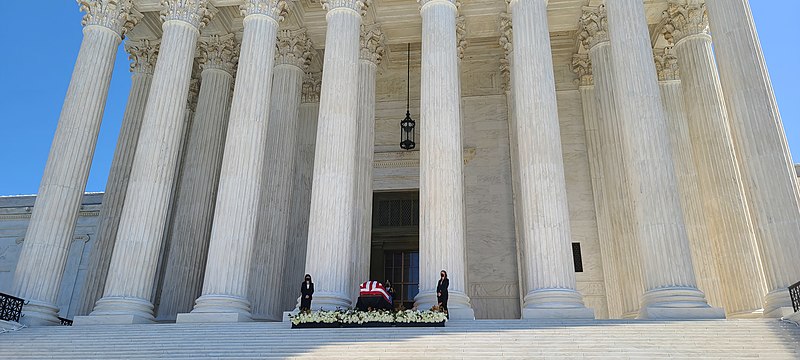Remembering Ruth Bader Ginsburg: The Ultimate Survivor
How RBG not only left us with a pioneering legacy of gender equality, but also a legacy of perseverance
COFFEEANDCRUMBS VIA WIKIMEDIA COMMONS
Ruth Bader Ginsburg will be remembered as a pillar of strength from her first case to her final days on the bench.
October 1, 2020
I remembered a few years back when Margaret Thatcher died and a hashtag stated: “#nowthatchersdead,” and people misunderstood it as “now-that-chers-dead.” Twitter exploded with the misinformation. When I first heard of Ruth Bader Ginsburg’s death last Friday, Sept. 18, I thought it was a similar unfortunate mistake.
I stood on the corner of an eerily desolate Madison Avenue and overheard a woman exclaim through sobs, “RBG did so much for us. I can’t believe she’s gone.” Assuming I had misheard her due to the lack of oxygen going to my brain from my mask, I was ready to disregard what I heard. And yet, one frantic Google search and a dropped phone later, the truth hit me.
After 87 impressive years, RBG was gone. In an interview for Elle Magazine in 2014, Ginsburg recalled the first time she argued before the Supreme Court in 1973. The case was on behalf of Sharon Frontiero, an Air Force lieutenant, who sued to prove that her husband was dependent on her to get housing and medical benefits for him. At the time, servicemen were automatically granted benefits for their wives. Ginsburg’s argument contributed to a landmark ruling in 1974, which stated that “benefits given by the United States military to the family of service members cannot be given out differently because of sex.”
Most people are well aware of the legal legacy she’s left behind. Perhaps fewer are familiar with some of the personal struggles she endured early on in her career as a budding lawyer and throughout her time as a Supreme Court justice.
We can honor Ruth Bader Ginsburg’s legacy by demonstrating how the best judge of character is sometimes in how a person acts during times of strife.
Shortly after enrolling in Harvard Law School in 1958, RBG’s husband, Martin Ginsburg, who was a senior at Harvard Law School, contracted advanced testicular cancer and required extensive care and treatment. Ruth Bader Ginsburg took notes for her husband and even typed up his final paper while simultaneously continuing her own law studies and raising her first child.
As if all the health struggles of her husband weren’t enough, in 1999, Ruth Bader Ginsburg was diagnosed with colon cancer and, shortly after, pancreatic cancer. Ruth Bader Ginsburg encountered professional and personal adversities throughout her career. And yet, her perseverance never seemed to waver. She remained a pillar of strength even during times when I imagine she wanted to give up.
During a time where we all feel bogged down by the uncertainty of the pandemic, we can look to RBG as a true inspiration for how to persevere no matter what lies ahead. If she were alive today, RBG would tell us to reach within ourselves, cultivate our inner strength and never compromise our integrity.
We can honor Ruth Bader Ginsburg’s legacy by demonstrating how the best judge of character is sometimes in how a person acts during times of strife.
I urge you, when you feel overwhelmed, to remember what RBG endured, and know that there is no situation where hope and human kindness is lost.
My dear Justice Ginsburg, thank you for dedicating your life to others, and have a wonderful rest. We will never forget you.
















Patty Surak • Oct 8, 2020 at 1:30 pm
This is a fantastic, well-written tribute to a one-of-a-kind woman!